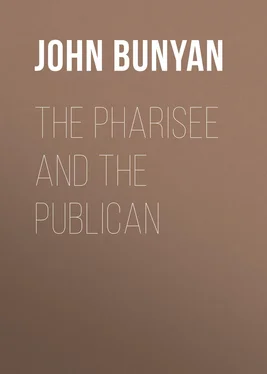John Bunyan - The Pharisee and the Publican
Здесь есть возможность читать онлайн «John Bunyan - The Pharisee and the Publican» — ознакомительный отрывок электронной книги совершенно бесплатно, а после прочтения отрывка купить полную версию. В некоторых случаях можно слушать аудио, скачать через торрент в формате fb2 и присутствует краткое содержание. Жанр: foreign_prose, foreign_religion, Философия, foreign_psychology, foreign_antique, на английском языке. Описание произведения, (предисловие) а так же отзывы посетителей доступны на портале библиотеки ЛибКат.
- Название:The Pharisee and the Publican
- Автор:
- Жанр:
- Год:неизвестен
- ISBN:нет данных
- Рейтинг книги:4 / 5. Голосов: 1
-
Избранное:Добавить в избранное
- Отзывы:
-
Ваша оценка:
- 80
- 1
- 2
- 3
- 4
- 5
The Pharisee and the Publican: краткое содержание, описание и аннотация
Предлагаем к чтению аннотацию, описание, краткое содержание или предисловие (зависит от того, что написал сам автор книги «The Pharisee and the Publican»). Если вы не нашли необходимую информацию о книге — напишите в комментариях, мы постараемся отыскать её.
The Pharisee and the Publican — читать онлайн ознакомительный отрывок
Ниже представлен текст книги, разбитый по страницам. Система сохранения места последней прочитанной страницы, позволяет с удобством читать онлайн бесплатно книгу «The Pharisee and the Publican», без необходимости каждый раз заново искать на чём Вы остановились. Поставьте закладку, и сможете в любой момент перейти на страницу, на которой закончили чтение.
Интервал:
Закладка:
“The Pharisee stood and prayed thus with himself.”
And in that it is said he prayed with himself, it may signify, that he went in his prayer no further than his sense and reason, feeling and carnal apprehensions went. True Christian prayer ofttimes leaves sense and reason, feeling and carnal apprehensions, behind it; and it goeth forth with faith, hope, and desires to know what at present we are ignorant of, and that unto which our sense, feeling, reason, &c., are strangers. The apostle indeed doth say, “I will pray with the understanding;” 1 Cor. xiv. 15; but then it must be taken for an understanding spiritually enlightened. I say, it must be so understood, because the natural understanding, as such, receiveth not the things of God, therefore cannot pray for them; for they to such are foolish things; 1 Cor. ii. 14.
Now, a spiritually enlightened understanding may be officious in prayer these ways—
1. As it has received conviction of the truth of the being of the Spirit of God; for to receive conviction of the truth and being of such things, comes from the Spirit of God, not from the law, sense, or reason; 1 Cor. ii. 10–12. Now the understanding having, by the Holy Ghost, received conviction of the truth of things, draweth out the heart to cry in prayer to God for them. Therefore he saith, he would pray with the understanding.
2. The spiritually enlightened understanding hath also received, by the Holy Ghost, conviction of the excellency and glory of the things that are of the Spirit of God, and so inflameth the heart with more fervent desires in this duty of prayer; for there is a supernatural excellency in the things that are of the Spirit: “For if the ministration of death (to which the Pharisee adhered), written and engraven in stones, was glorious, so that the children of Israel could not steadfastly behold the face of Moses, for the glory of his countenance, which glory was to be done away; how shall not the ministration of the Spirit be rather glorious? For if the ministration of condemnation be glory, much more doth the ministration of righteousness exceed in glory: for even that which was made glorious hath no glory in this respect, by reason of the glory that excelleth;” 2 Cor. iii. 7–10. And the Spirit of God sheweth, at least, some things of that excellent glory of them to the understanding that it enlighteneth; Eph. i. 17–19.
3. The spiritually enlightened understanding hath also thereby received knowledge, that these excellent supernatural things of the Spirit are given by covenant in Christ to those that love God, and are beloved of him. “Now we have received,” says Paul, “not the spirit of the world (that the Pharisee had), but the Spirit which is of God, that we make know the things that are freely given to us of God;” 1 Cor. ii. 12. And this knowledge, that the things of the Spirit of God are freely given to us of God, puts yet a greater edge, more vigour, and yet further confidence, into the heart to ask for what is mine by gift, by a free gift of God in his Son. But all these things the poor Pharisee was an utter stranger to; he knew not the Spirit, nor the things of the Spirit, and therefore must neglect faith, judgment, and the love of God, Matt. xxiii. 23; Luke xi. 42, and follow himself only, as to his sense, feeling, reason, and carnal imagination in prayer.
He stood and prayed thus “with himself.” He prayed thus, talking to himself; for so also it may (I think) be understood. It is said of the unjust judge, “he said within himself, Though I fear not God, nor regard man,” &c., Luke xviii. 4; that is, he said it to himself. So the Pharisee is said to pray with himself: God and the Pharisee were not together, there was only the Pharisee and himself. Paul knew not what to pray for without the Holy Ghost joined himself with him, and helping him with groans unutterable; but the Pharisee had no need of that; it was enough that he and himself were together at this work; for he thought without doubting that he and himself together could do. How many times have I heard ancient men, and ancient women at it with themselves, when all alone in some private room, or in some solitary path; and in their chat they have been sometimes reasoning, sometimes chiding, sometimes pleading, sometimes praying, and sometimes singing; but yet all has been done by themselves when all alone; but yet so done, as one that has not seen them must needs have concluded that they were talking, singing, and praying with company, when all that they had said, they did it with themselves, and had neither auditor nor regarder.
So the Pharisee was at it with himself; he and himself performed, at this time, the duty of prayer. Now I observe, that usually when men do speak to or with themselves, they greatly strive to please themselves: therefore it is said, there is a man “that flattereth himself in his own eyes, until his iniquity be found to be hateful;” Psalm xxxvi. 2. He flattereth himself in his own way, according as his sense and carnal reason dictate to him; and he might do it as well in prayer as in any other way. Some men will so hear sermons and apply them that they may please themselves; and some men will pray, but will refuse such words and thoughts in prayer as will not please themselves.
O how many men speak all that they speak in prayer, rather to themselves, or to their auditory, than to God that dwelleth in heaven. And this I take to be the manner, I mean something of the manner, of the Pharisee’s praying. Indeed, he made mention of God, as also others do; but he prayed with himself to himself, in his own spirit, and to his own pleasing, as the matter of his prayer doth manifest. For was it not pleasant to this hypocrite, think you, to speak thus well of himself at this time? Doubtless it was. Also children and fools are of the same temper with hypocrites, as to this: they also love, without ground, as the Pharisee, to flatter themselves in their own eyes; “But not he that commendeth himself is approved.”
“God, I thank thee, I am not as other men are, extortioners, unjust, adulterers, or even as this Publican,” &c.
Thus he begins his prayer; and it is, as was hinted before, a prayer of the highest strain. For to make a prayer all of thanksgiving, and to urge in that prayer the cause of that thanksgiving, is the highest manner of praying, and seems to be done in the strongest faith, &c., in the greatest sense of things. And such was the Pharisee’s prayer, only he wanted substantial ground for his thanksgiving; to wit, he wanted proof of that he said, He was not as other men were, except he had meant, he did not, that he was even of the worst sort of men: For even the best of men by nature, and the worst, are all alike. “What, then, are we better than they? (saith Paul), No, in nowise;” Rom. iii. 9. So then he failed in the ground of his thankfulness, and therefore his thankfulness was grounded on untruth, and so became feigned and self-flattering, and could not be acceptable with the God of heaven.
Besides, in this high prayer of the Pharisee, he fathered that upon God which he could by no means own; to wit, that he being so good as he thought himself to be, was through distinguishing love and favour of God—“God, I thank thee, that I am not as other men are.” I thank thee, that thou hast made me better than others; I thank thee that my condition is so good, and that I am so far advanced above my neighbour.
There are several things flow from this prayer of the Pharisee that are worth our observation: as—
1. That the Pharisees and hypocrites do not love to count themselves sinners, when they stand before God.
They choose rather to commend themselves before him for virtuous and holy persons, sometimes saying, and oftener thinking, that they are more righteous than others. Yea, it seems by the word to be natural, hereditary, and so common for hypocrites to trust to themselves that they are righteous, and then to condemn others: this is the foundation upon which this very parable is built: “He spake this parable (saith Luke) unto certain which trusted in themselves as being righteous,” or “that they were” so, “and despised others,” ver. 9.
Читать дальшеИнтервал:
Закладка:
Похожие книги на «The Pharisee and the Publican»
Представляем Вашему вниманию похожие книги на «The Pharisee and the Publican» списком для выбора. Мы отобрали схожую по названию и смыслу литературу в надежде предоставить читателям больше вариантов отыскать новые, интересные, ещё непрочитанные произведения.
Обсуждение, отзывы о книге «The Pharisee and the Publican» и просто собственные мнения читателей. Оставьте ваши комментарии, напишите, что Вы думаете о произведении, его смысле или главных героях. Укажите что конкретно понравилось, а что нет, и почему Вы так считаете.












